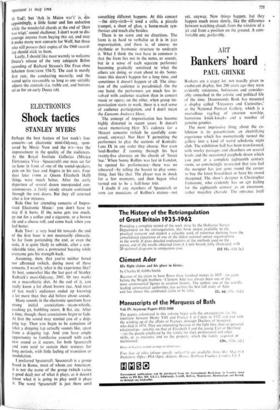Shock tactics
ELECTRONICS STANLEY MYERS
Perhaps the best feature of last week's four concerts—an electronic mini-Odyssey, spon- sored by Music Now and the IcA—was the improvement in the quality of the audiences. At the Royal Institute Galleries (Musica Elettronica Viva—Spacecraft) one man sat for an hour in front of one of the sound-speakers, pain on his face and fingers in his ears. Four days later (AMM at Queen Elizabeth Hall) things were much better. After the early departure of several dozen unexpanded con- sciousnesses, a fairly steady stream continued through the exit doors. But they all returned after a few minutes.
Rule One for attending concerts of Impro- vised Electronic Music: you don't have to stay if it. hurts. If the_ noise gets too much, go out for a coffee and a cigarette, or a brown ale and a cheese roll, and come back when you feel better.
Rule Two : a very loud bit towards the end of the first hour is not necessarily climactic. So far from portending the end, or even the coda, it is quite likely to subside, after a con- siderable time, into a protracted buzzing while everyone gets his strength back.
Assuming, then, that you're neither bored nor affronted (which, during most of these concerts, I wasn't), what is the experience like? At best, somewhat like the last part of Stanley Kubrick's maxi-Odyssey, 2001. Or two weeks on a macrobiotic diet. At the end of it, you really know a lot about brown rice. And most of last week's audiences ended up knowing a lot more than they did before about sounds.
Many sounds in the electronic spectrum have strong initial associations—steam-whistle, crashing jet, bubbling retort, B flat, etc. After a time, though, these associations begin to fade. At first the sound may remind you of a drip- ping tap. Then you begin to be conscious of what a dripping tap actually sounds like, apart from a dripping tap. And you have ample opportunity to familiarise yourself with each new sound as it occurs, for both Spacecraft and AMM tend to sustain their textures for long periods, with little feeling of transition or modulation.
I preferred Spacecraft. Spacecraft is a group based in Rome, most of whom are American; it is not the name of the group (which varies a good deal) nor of what it plays, as it doesn't know what it is going to play until it plays it. The word 'Spacecraft' is just there until
something different happens. At this concert —the sixty-sixth—it used a cello, a piccolo trumpet, a sheet of glass, a home-made syn- thesiser and much else besides.
There is no score and no directions. The form is as hard to verbalise as it is in jazz improvisation, and there is, of course, no rhythmic or harmonic structure to underpin it. What I think the two have in common is that the form lies not in the notes, or sounds, but in a sense of each separate performer becoming gradually sensitised to what the others are doing, or even about to do. Some- times this doesn't happen for a long time, and sometimes it doesn't happen at all. The situa- tion of the audience is paradoxical. On the one hand, the performers are much less in- volved with audience reaction than in concert music or opera; on the other, when group im- provisation starts to work, there is a real sense of audience participation, and I don't mean the Eamonn Andrews Show.
The concept of improvisation has become highly distorted in recent years. It doesn't mean memorising Herr X's cadenza for a Mozart concerto (which he carefully com- posed, anyway). Nor Herr Y permitting the performers to play the sections of Kontakt- Lens IX in any order they choose. Nor even Soul-Brother Z running through his best twenty-five choruses on the chords of 'Sweet Sue.' When Sonny Rollins was last in London, he opened his performance—there was no rehearsal—by telling the bassist to play some- thing. Just like that. The player was in shock for a few moments, and then began what turned out to be a half-hour trio.
I doubt if any members of Spacecraft or AMM are musicians of Rollins's stature—not
yet, anyway. New things happen, but they happen much more slowly, like the difference o between watching clouds from the window of a jet and from a position on the ground. A com- fortable one, preferably.






































 Previous page
Previous page